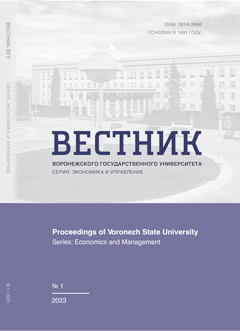Об учете факторов устойчивого развития в финансовом моделировании инвестиционных проектов
Аннотация
Предмет. Разработка финансовых моделей является важнейшим инструментом инвестиционного анализа, позволяющим дать оценку коммерческой привлекательности проектов с учетом рисков их реализации. Важнейшие риски, которые оказывают влияние на ключевые параметры финансовой модели многих инвестиционных проектов, связаны с факторами устойчивого развития. В статье исследуются вопросы учета влияния факторов устойчивого при разработке финансовых моделей инвестиционных проектов.
Метод. В процессе исследования применялись методы логического, статистического, финансового анализа. Использовались данные финансовой отчетности, составленной на основе МСФО, раскрытий и презентаций для инвесторов, представленных на их сайтах, а также публичной нефинансовой отчетности российских компаний (отчетов об устойчивом развитии, интегрированной отчетности), данные по показателям ЦУР Росстата, аналитических и рейтинговых агентств, результаты проводимых на международном уровне исследований и рекомендации профессиональных организаций
Цели. Комплексное исследование проблемы разработки финансовой модели с учетом требований, рисков и возможностей устойчивого развития в интересах принятия инвестиционных решений.
Результаты. Количественная оценка финансовых последствий влияния ESG факторов на параметры финансовой модели требует подробных эмпирических исследований по широкому кругу критериев. Отсутствие прозрачности как в используемой методике анализа, так и в данных, используемых для оценки влияния ESG факторов на финансовые показатели инвестиционного проекта, препятствует развитии методологии инвестиционного анализа и широкому распространению лучших практик. В целях выработки общего подхода и как обобщение результатов проведенного исследования рекомендована последовательность процедур интеграции ESG факторов при разработке финансовой модели.
Литература
Efimova, O.V. & Rozhnova, O.V. (2021) On the integration of issues of sustainable development into the system of university graduate training (on the example of accounting and analytical specialty). Modern economics: problems and solutions. 4, 8–19. DOI: 10.17308/meps.2021.4/2571 (In Russian)
Efimova, O. V. (2020). Formation of information on cash flows for the purpose of investment decisions. Proceedings of Voronezh State University. Series: Economics and Management. 2, 116-130. DOI: 10.17308/econ.2020.2/2895 (In Russian)
Lyubushin, N.P., Babicheva, N.E., Igoshev, A.K. & Kondrashova, N.V. (2015) Modeling sustainable development of economic systems of various hierarchical levels based on the resource-based approach Economic analysis: theory and practice. 48 (447), 2-12. (In Russian)
Malyshenko, V.A., & Malyshenko, K.A. (2018) Modeling the complex financial stability of a corporation in the era of global economic crises Economic and social changes: facts, trends, forecast. 11 (2), 127-143. (In Russian)
Amel-Zadeh, A. & Serafeim, G. (2017) Why and How Investors Use ESG Information: Evidence from a Global Survey. Harvard Business school. Working paper. 74 (3), 87–103.
Barnett, M. & Salomon R. (2006) Beyond dichotomy: The curvilinear relationship between social responsibility and financial performance Strategic Management Journal. 27 (11), 1101-1122.
Busch, T., Bauer, R. & Orlitzky, M. (2016) Sustainable Development and Financial Markets: Old Paths and New Avenues. Business and Society. 55 (3), 303-329, DOI: 10.1177/0007650315570701.
Cheng, B., Ioannou, I. & Serafeim, G. (2014) Corporate Social Responsibility and Access to Finance. Strategic Management Journal. 35, 1-23.
Clark, G., Feiner, A. & Viehs M. (2015) From the stockholder to the stakeholder: how sustainability can drive financial performance. University of Oxford. DOI: 10.2139/ssrn.2508281
Dhaliwal, D., Zhen Li, Tsang, A. & Yang, Y. (2011) Voluntary Nonfinancial Disclosure and the Cost of Equity Capital: The Initiation of Corporate Social Responsibility Reporting. The Accounting Review. 86 (1), 59-100.
Eccles, R. G., Ioannou, I., & Serafeim, G. (2013) The Impact of Corporate Sustainability on Organizational Processes and Performance. Management Science. 60 (11), 2835–2857.
Efimova, O.V. & Koroleva, D.A. (2019) Development of a financial analysis tool: risk assessment in the process of studying in the investment projects efficiency. Humanitarian Balkan Research. 3 (4), 57-61.
Friede, G., Busch, T. & Bassen, A. (2015) ESG and financial performance: aggregated evidence from more than 2000 empirical studies. Journal of Sustainable Finance and Investment. 5 (4), 210-233.
Goss, A. & Roberts, G. (2011) The impact of corporate social responsibility on the cost of bank loans. Journal of Banking & Finance, Elsevier. 35 (7), 1794-1810.
Khan, M., Serafeim, G. & Yoon, A. (2015) Corporate Sustainability: First Evidence on Materiality. The Accounting Review. 91 (6), 1697-1724.
Schramade, W. (2016) Integrating ESG into valuation models and investment decisions: the value driver adjustment approach Journal of Sustainable Finance & Investment. 6 (2), 96–111.
Van Burren, Plantinga, A. & Scholtens, B. (2016) ESG Integration and the Investment Management Process: Fundamental Investing Reinvented. Journal of Business Ethics. 138 (3), 525–533.
Copyright (c) 2021 Ефимова О.В.

Это произведение доступно по лицензии Creative Commons «Attribution» («Атрибуция») 4.0 Всемирная.























